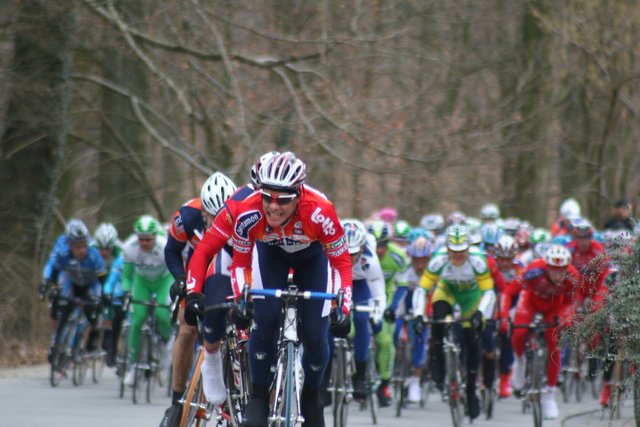The "Winning" Strategy: How to be part of the game in the long run?

Scrolling through the best selling business books and motivation guides, you will find many dealing with winning and success. It seems that many people want to have the best business idea, the smartest kid, the cutest dog, the biggest income, the most followers, the „top-of-the-trending" post etc. It's all about being the best rather than just being part of a team... But do we really need to win all the time?

Winning at all costs
Back in the 80s, a researcher, Robert Goldman asked leading athletes whether they would take an unknown performance-enhancer drug if it would guarantee to win a gold medal but kill them within 5 years. Over half of them said that they would take it...
So how desperately do we want to win? You do not have to be an athlete, many of us are obsessed with winning. „Second place is the best loser." – some use to say. But is it true? Can we really divide the world into „winners" and „losers"? We cannot rely on others if we look at them as if they were competitors... Still, many strive to be on top.
If we set winning goals, we easily end up feeling bad, causing an unnecessary stress to ourselves, which then may lead to burning out and several physical symptoms as „side"-effects. Is this really what we want?

Winning and cardiovascular problems
Two cardiologists, Friedman and Rosenman have noticed that a certain behaviour pattern closely correlates with a high probability of cardiovascular problems (eg. high blood pressure) and especially with the coronary heart disease. These are:
- competitiveness
- highly self-critical and perfectionistic attitude
- high work involvement (overtime, lack of rest and relaxation, too tight schedule)
- strong time-pressure, feeling a constant sense of urgency, struggling against the clock
- hostility, impatience and aggression towards others (especially towards those causing setbacks in productivity) – a good indicator of the „fight or flight" reaction induced by stress hormones.
Do you recognize these behaviours on yourself or on someone in your close environment? Well, probably it's time to change perspective then.

Changing the perspective
On average, approximately 3 % of participants will end up with a gold medal during the Olympic games. Similarly, only a small proportion of the entire society will be a member of the economic elite. Therefore most competitors will end up losing, regardless of how hard they try – if we look at it from that angle.
But what if we changed perspective?
Our brain is a powerful thing. Our perception can actually change the reality of the game itself: our ideas about how things work will have an influence on our behaviour. And not only that: we can also change our self-confidence and our feelings, too.
Instead of looking at winning and losing in a situation, why don't you simply focus on experiences gained? Instead of concentrating on your „lost chances", you can list the things that you have learnt, the things that made you stronger, the benefits of the situation. (You know, the glass is always half-full...)
This helps to protect your self-confidence and maintain your motivation!
According to several studies in psychology, external motivators like praise or competition weaken our intrinsic motivation – so literally, external motivation takes away the joy of doing something. (Another factor that speeds up burn-out.)

The best strategy is openness
Robert Axelrod, an American political scientist raised the question: Can we cooperate in a world where everyone is driven by his/her own interests? He created a contest that was inspired by the famous game theory example the prisoners' dilemma. He invited many scientists and asked them to send him their strategies in the form of a computer program.
Each programme was competing with all of the others in a competition based on the following rules:
- Each round consisted of 200 steps. At each step programmes would decide if they cooperate or compete with the other programme.
- The winner was the programme collecting the most points during these 200 steps.
- Scoring was based on the combination of the two decisions:
| Action | Scoring |
| If both decided to cooperate | Both received 3 points |
| If both decided to compete | Both received minus 1 point |
| If one decided to cooperate, while the other was competing | The one cooperating received 0 points, while the one competing received 5 points |
Axelrod received 14 programmes, these were competing with each other plus there was a 15th program which randomly decided to cooperate or to compete.
The winner was the simplest programme, created by social psychologist Anatol Rapoport. The programme was called, Tit for Tat and consisted only two lines:
- First cooperate.
- Then always do what the other did in the previous round.
The twist in the story that they have published the results and opened a second round to which 62 programmes were sent. Trusting in his simple programme, Rapoport sent Tit for Tat again. – And, as you have already found it out, he won again!
What were the characteristics of this winning strategy?
- friendliness – the program never initiated competition (it doesn't mean that it did not compete, but never did it for the first time)
- forgiving – returning to cooperation after a „bad step" of the other program
It seems that these strategies work in real life, too. Starting with an open hand can enhance cooperation and get better results in the long run...
So before you consider your friends, colleagues or even family members as competitors, why don't you trust them and cooperate?

Literature used
Margaret Heffernan (2014): A Bigger Prize: How We Can Do Better than the Competition, Public Affairs, New York
Barry J. Nalebuff and Adam M. Brandenburger (1996): Co-opetition, Doubleday, New York
Friedman, M. and Rosenman, R. H. (1971): Type A behavior pattern: its association with coronary heart disease. In: Ann. Clin. Res. 1971 Vol. 3. No. 6 pp. 300-312
Robert Axelrod (1984): The evolution of cooperation. Basic Books, New York
Sources of pictures
All pictures used in this post are public domain images (CC0 license)
taken from the following sources:
1 Author: Chris de Kok (member of freeimages.com)
2 Author: Ulrik de Wachter (member of freeimages.com)
3 Author: Luke Walker (member of freeimages.com)
4 Author: Carien van Hest (member of freeimages.com)
5 Author: Richard Dudley (member of freeimages.com)

I just resteemed your post to my 32,000+ followers @a-a-a :)
Our society has become so competitive.
The question that we should ask ourself, I think, is what is there to win?
Winning happiness in life is worth all the trophies in the world. Winning happiness is not beating others, it is winning against the difficulties of life and feeling content with the goals we set to ourself.
Setting the bar to an achievable height and being happy about it, that is a great win for anybody.
I totally agree :-)
Winning should not be the focus.
Great article!
Let go of winning and losing and find joy!
Haha, you are right! :-)
Great post!
Thanks for tasting the eden!
You got a 14.03% upvote from @sunrawhale courtesy of @ksolymosi!
This service has been created with the help of @yabapmatt so please show your support by voting for him for witness!
Congratulations! This post has been upvoted from the communal account, @minnowsupport, by ksolymosi from the Minnow Support Project. It's a witness project run by aggroed, ausbitbank, teamsteem, theprophet0, someguy123, neoxian, followbtcnews, and netuoso. The goal is to help Steemit grow by supporting Minnows. Please find us at the Peace, Abundance, and Liberty Network (PALnet) Discord Channel. It's a completely public and open space to all members of the Steemit community who voluntarily choose to be there.
If you would like to delegate to the Minnow Support Project you can do so by clicking on the following links: 50SP, 100SP, 250SP, 500SP, 1000SP, 5000SP.
Be sure to leave at least 50SP undelegated on your account.
Being A SteemStem Member